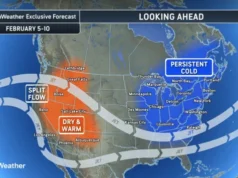
WASHINGTON (AP) — The Trump administration is asking the Supreme Court to allow restrictions on birthright citizenship to partly take effect while legal fights play out.
In emergency applications filed at the high court on Thursday, the administration asked the justices to narrow court orders entered by district judges in Maryland, Massachusetts and Washington that blocked the order President Donald Trump signed shortly after beginning his second term.
The order currently is blocked nationwide. Three federal appeals courts have rejected the administration’s pleas, including one in Massachusetts on Tuesday.
The order would deny citizenship to those born after Feb. 19 whose parents are in the country illegally. It also forbids U.S. agencies from issuing any document or accepting any state document recognizing citizenship for such children.
Roughly two dozen states, as well as several individuals and groyups have sued over the executive order, which they say violates the Constitution’s 14th Amendment promise of citizenship to anyone born inside the United States.
The Justice Department argues that individual judges lack the power to give nationwide effect to their rulings.
[Continue reading below]The administration instead wants the justices to allow the Trump’s plan to go into effect for everyone except the handful of people and group that sued, arguing that the states lack the legal right, or standing, to challenge the executive order.
As a fallback, the administration asked “at a minimum” to be allowed to make public announcements about how they plan to carry out the policy if it eventually is allowed to take effect.
Five conservative justices, a majority of the court, have raised concerns in the past about nationwide, or universal, injunctions.
But the court has never ruled on the matter.
The administration made a similar argument in Trump’s first term, including in the Supreme Court fight over his ban on travel to the U.S. from several Muslim majority countries.
The court eventually upheld Trump’s policy, but did not take up the issue of nationwide injunctions.
Disclaimer
The information contained in South Florida Reporter is for general information purposes only.
The South Florida Reporter assumes no responsibility for errors or omissions in the contents of the Service.
In no event shall the South Florida Reporter be liable for any special, direct, indirect, consequential, or incidental damages or any damages whatsoever, whether in an action of contract, negligence or other tort, arising out of or in connection with the use of the Service or the contents of the Service.
The Company reserves the right to make additions, deletions, or modifications to the contents of the Service at any time without prior notice.
The Company does not warrant that the Service is free of viruses or other harmful components












